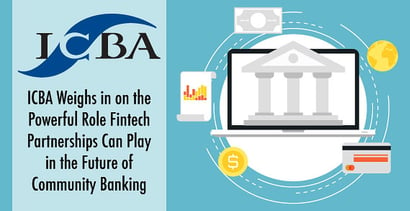

In a Nutshell: Innovation is changing the way all companies do business, and community banking is no exception. While community banking is known for its relationship business model and prolific local lending to area residents, entrepreneurs, and agricultural enterprises, it is also known for being nimble and agile enough to make innovation happen quickly. That’s one of the many reasons why the Independent Community Bankers of America (ICBA) is committed to helping community banks partner with fintech companies. “Fintech partnerships can provide additional, targeted value for customers and help community banks achieve specific goals — often at a faster pace than larger institutions,” said Kevin Tweddle, ICBA Group Executive Vice President, Innovation and Financial Technology. “ICBA is pursuing initiatives that will create an efficient distribution system for fintech products, and ultimately, bring community bankers and innovators together in a unified industry that leverages technology to meet the needs of these local financial institutions and their customers.”
We all know that technology can help us save time and money. So when questions like, “Did I remember to pay my credit card balance this month? Is it due tomorrow? Or was it due today?” pop into our minds, we may stop and think: How can I answer these questions right now?
Would you go to your bank’s online service center, log in, navigate to your credit card account, and look up the information? Wouldn’t it be easier to simply ask your phone, “Have I paid my credit card bill yet?”
Customers of community bank, Mercantile Bank of Michigan, can do exactly that thanks to MercMoney®, a chatbot developed in partnership with Abe AI. The bank’s customers can interact with the bot through Facebook Messenger, Google Home, and SMS. It answers finance and banking questions like: “How much money is left in my budget? What was my spending total last month? What’s my account number?” Users can get immediate answers to these questions without having to log into an online banking tool to look them up.
This application of artificial intelligence (AI) and conversational technology to personal finance is emblematic of the way community banks can leverage fintech partnerships to improve customer experiences. The relationship between fintech and banking, though, wasn’t always quite so cooperative. Initially, fintech attempted to fill the role of banks, while some community banks tried to top fintech offerings on their own.
“Over time, I think they both gained a little bit of respect for each other,” said Kevin Tweddle, Group Executive Vice President, Innovation and Financial Technology for Independent Community Bankers of America (ICBA). “I think the fintech companies realized that the business of banking is more difficult than they originally envisioned, and that it’s a heavily regulated industry. Meanwhile, the community bankers realized fintech companies can be a great resource to give them an opportunity for bringing solutions to market at a faster rate.”
In his recent op-ed piece published in American Banker, Tweddle argues that partnerships like the one between Mercantile and Abe AI are shaping the future of community banking.
In this emerging dynamic, ICBA will serve a prominent role in facilitating similar partnerships between community banks and fintech’s as we move towards an integrated industry that merges banking with fintech.
“We’re taking that collaborative approach on behalf of the thousands of community banks across the nation,” Tweddle said.
The Four Functions of Fintech in Community Banking
Financial technology is a toolbox that lets banks solve problems, and foremost among these is improving member experience. Tweddle predicts enhanced customer service will be the driving force of future fintech innovations for community banks.
During our conversation, Tweddle told us community banks can leverage fintech to achieve four fundamental goals.

Kevin Tweddle, Group Executive Vice President of Innovation and Financial Technology for ICBA.
“They’re going to want to grow revenue; they’re going to want to cut costs and become more efficient; they’re going to want to mitigate their risk; and they’re going to want to get a better understanding of their customers and improve their customers’ banking experience,” Tweddle said. “When a community bank buys something or partners with fintech, they’re trying to solve one or a combination of those four things every time.
“The biggest performance mover is going to be what’s going to create revenue opportunities. Lending is probably one of the most important facets of banking — and in particular for community banking to service the needs of local customers. The way fintech has approached the various facets of lending — making it more efficient and creating a better customer experience — is something community banks are looking for.”
Live Oak Bank and Mercantile Bank Leverage Fintech for Customer Service
Mercantile’s partnership with Abe AI improved efficiency to meet customer needs by quickly and easily giving members the information they want. This innovation is something larger banks can’t implement as easily or quickly, and that gives Mercantile an edge in attracting consumers.
North Carolina-based Live Oak Bank is another example of what’s possible when community banks leverage fintech partnerships to improve offerings.
“Live Oak Bank is one of the largest SBA lenders in the country, so they were looking at a more efficient means to offer SBA loans beyond their community, outside their community markets, and on a national scale. Efficiency of the loan process was the problem they were trying to solve,” Tweddle said.
Live Oak Bank is playing a particularly prominent role in innovation through its partnership with New York-based fintech firm, First Data. The two companies teamed up to create Apiture, which was designed to help community banks offer customers a robust digital experience.
Overcoming Obstacles to Distribution and Standardization
Community banks face the challenge and opportunity of serving their unique communities. Each community’s needs are different, and so each community bank’s strategies for meeting those needs are also unique. As such, community banks need an effective way of choosing and implementing fintech solutions.
One option is creating a centralized ecosystem for distribution, similar to the iTunes or Google Play model. Banks wouldn’t need to buy a suite of products just to get the one they want. Instead, they could mix and match the individual components that best meet their specific needs.
“Community banks are trying to drive to that type of environment to lower their cost of operation and allow them to become more efficient,” Tweddle said. For this model to succeed, though, the industry requires standards to establish and maintain consistency. “The fintechs are a bit more reluctant because they all want to create their own proprietary technology. So, they’re not all quite as willing to sit at the table together and create standards.”
To facilitate this cooperative effort, ICBA is working on initiatives that will bring fintech companies and community banks together. Through these efforts, ICBA hopes to help community banks and fintech companies enter into a productive dialogue that will shape the future of banking. To further educate community banks about working with fintech companies and opportunities for partnership, ICBA released a Fintech Strategy Roadmap earlier this year.
ICBA Plans to Take an Active Role in Integrating the Fintech and Banking Industries
“Where we are today is a perfect situation for a partnership. I think both sides need each other to create a win-win, and they both respect what they each do well,” Tweddle said. “I think fintech won’t be a separate industry from banking five years from now. I think they’ll merge together and become one, and we will just call it banking.”
To facilitate this melding, ICBA is working on several exciting initiatives, which it plans to roll out this fall and over the next year.

These initiatives will help community banks resolve specific challenges with their innovation and fintech strategies. On the flip side, early stage fintech companies will gain a stronger understanding of the community banking industry. This will also open fintech companies’ options beyond just competing for large corporate clients and will help them achieve success by getting products to the market faster.
ICBA is fully committed to helping community banks flourish by making smart, strategic innovation decisions so they can continue to do what they do best — serve the needs of their customers and communities while growing local economic prosperity.
Advertiser Disclosure
BadCredit.org is a free online resource that offers valuable content and comparison services to users. To keep this resource 100% free for users, we receive advertising compensation from the financial products listed on this page. Along with key review factors, this compensation may impact how and where products appear on the page (including, for example, the order in which they appear). BadCredit.org does not include listings for all financial products.
Our Editorial Review Policy
Our site is committed to publishing independent, accurate content guided by strict editorial guidelines. Before articles and reviews are published on our site, they undergo a thorough review process performed by a team of independent editors and subject-matter experts to ensure the content’s accuracy, timeliness, and impartiality. Our editorial team is separate and independent of our site’s advertisers, and the opinions they express on our site are their own. To read more about our team members and their editorial backgrounds, please visit our site’s About page.
